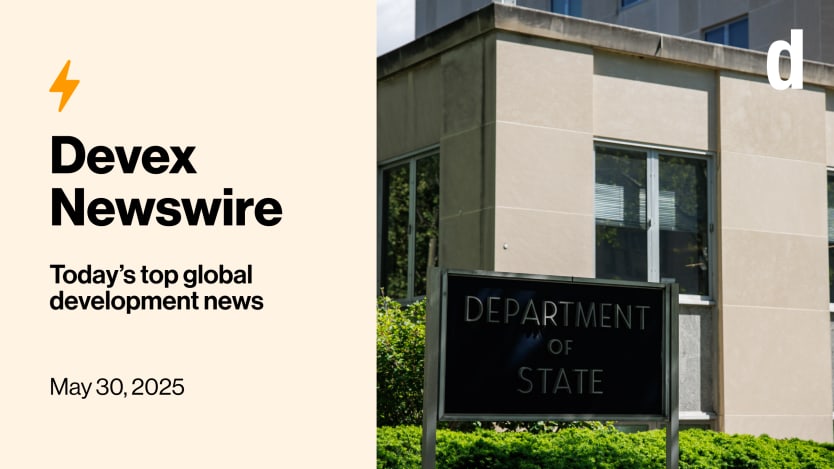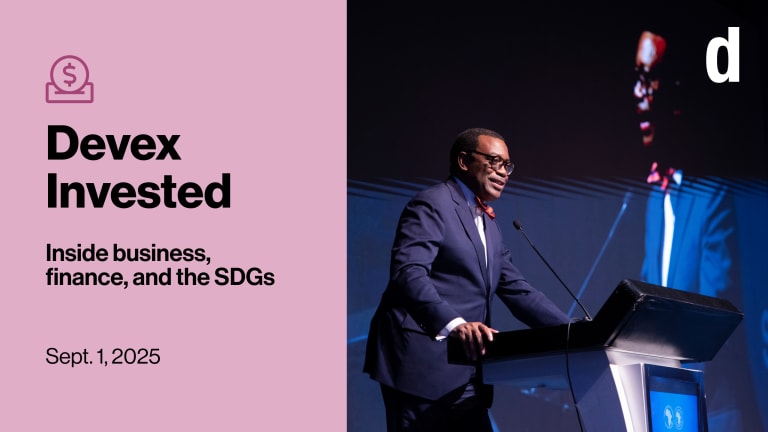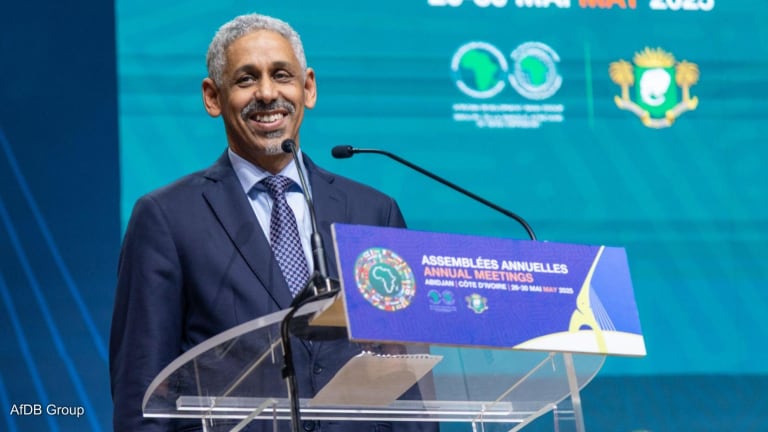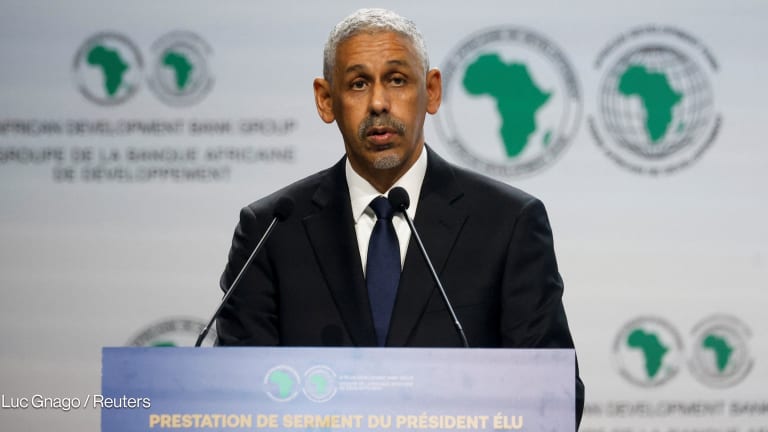
A leaked reorganization plan reveals the U.S. State Department will slash 3,448 jobs and eliminate key human rights and refugee offices. The overhaul emphasizes “American and Western values” and shifts foreign aid control to regional bureaus.
Also in today’s edition: Mauritanian economist Sidi Ould Tah to take the helm at AfDB, and how tariff and aid cuts are affecting Africa’s economic growth.
Diplomacy redefined
The U.S. State Department is gearing up for a sweeping overhaul that would cut thousands of jobs, strip back its human rights and refugee mandates, and reframe U.S. diplomacy around what it calls “American and Western values,” according to a leaked reorganization plan sent to Congress.
The move marks another round of government cuts with major implications for foreign aid and global development. The proposal affects some 300 offices and calls for shrinking the department’s workforce by 3,448 positions — 1,575 via buyouts, the rest through layoffs, writes Senior Global Reporter Colum Lynch.
“[The] proliferation of bureaus and offices with unclear, overlapping, or duplicative mandates has hobbled the Department’s ability to rapidly respond to emerging threats and crises,” writes Paul Guaglianone, the State Department’s top legislative official. Secretary of State Marco Rubio “expects this exercise will result in a nimbler and more proactive Department,” Guaglianone adds.
Notably, President Donald Trump would appoint a new undersecretary of state for foreign assistance and humanitarian affairs, subject to Senate approval. “Conceptually, it’s good that there is a senior-level official who is responsible for foreign assistance, and, therefore, one should get better coherence,” says George Ingram, a senior fellow at the Brookings Institution.
“The problem is there is not much foreign assistance under it, not much development assistance,” he adds, noting that it primarily oversees humanitarian, refugee, and migration issues.
Meanwhile, many long-standing thematic offices — including those focused on human rights, global women’s issues, and conflict prevention — would be dissolved or absorbed into regional bureaus. “These offices, which have proven themselves prone to ideological capture and radicalism, will be eliminated,” the memo states. Day-to-day management of nonsecurity foreign assistance would shift to regional offices.
The plan also introduces an Office of Natural Rights, which would “ground the Department’s values-based diplomacy in traditional western conceptions of core freedoms” and tackle “free speech backsliding in Europe and other developed nations.” The move echoes recent remarks by Vice President JD Vance and other Republicans critical of European restrictions on conservative speech.
The refugee bureau would be transformed into a migration-focused agency, with new offices handling repatriation and tracking.
Read: State Dept overhaul to cut 3,400 jobs, recast focus on US values
ICYMI: State Department releases new ‘America First’ reorganization plan
Plus: State Department refugee office assumes USAID’s disaster response role
+ Explore our dedicated page for all the latest news, in-depth analysis, and exclusive insights on how the Trump administration’s policies are reshaping global development.
Africa’s economic outlook slips
Tariffs, trade wars, and shrinking Western aid — including the dismantling of USAID — have forced a downgrade in Africa’s 2025 growth forecast, now at 3.9% from 4.1% earlier, the African Development Bank says. Still, 21 countries are set to grow more than 5%, thanks to “hard-won gains from effective domestic reforms, relative diversification, and improved macroeconomic management.”
Aid matters, if used wisely, says Kevin Chika Urama, co-author of the African Economic Outlook 2025 report. “I don’t believe that aid leads to growth, but I don’t believe that aid is not necessary for growth. It is. But it is how it is delivered and how it is utilized,” he says.
Forty-seven out of 55 African countries are currently grappling with U.S. tariffs with southern Africa hit hardest. “In today’s world, the only reliable ally you have is yourself,” says AfDB’s Marie-Laure Akin-Olugbade. “So Africa must look inward.”
Growth in southern Africa is now just 0.8%, writes my colleague Ayenat Mersie. Botswana and Lesotho are especially exposed due to diamonds and apparel exports.
Governments are turning to private finance, but Urama warns: “The private sector does not come to do development. I am sorry. The private sector comes for profit.” Instead, public funds should be used to unlock private capital — and African countries must tighten tax rules. “Profit-shifting ... costs the continent an estimated $275 billion annually,” the report says.
Remittances fell in 2023 but could hit $100 billion in 2025. The report suggests securitizing flows and implementing a diaspora income tax. If done right, “such a tax would give the diaspora a strong sense of belonging and claim to participate in national affairs such as voting and holding leaders accountable.”
Read: Tariffs and aid cuts jolt Africa’s growth — but the overall outlook is upbeat
Further reading: Remittances outstrip aid 3 times over. Can they transform development? (Pro)
+ As debt distress rises across the global south, the question of how to finance sustainable development is more urgent than ever. For the second event in our series previewing the fourth Financing for Development summit, join us next Tuesday, June 3, for a Devex Pro briefing on Debt, development, and power: The road to FfD4. We’ll be joined by experts Iolanda Fresnillo, David Grigorian, Eric LeCompte, and Hannah Ryder to dig into how politics, power dynamics, and reform proposals are shaping the global debt conversation.
Not yet a Devex Pro member? Take advantage of the 15-day free trial today to access this event as well as all other exclusive events and content.
New era at AfDB
Sidi Ould Tah, a Mauritanian economist with 35 years of experience in international and African finance, will be the next president of the African Development Bank. He takes over at a tense moment for African economies, as global aid declines and markets wobble, writes Ayenat.
Tah won in a landslide, securing over 76% of the vote in the final round against Zambia’s Samuel Maimbo. “Let us go to work,” he told reporters in Abidjan yesterday, where 5,000 delegates gathered for the AfDB’s annual meeting. He replaces Akinwumi Adesina, known for tripling the bank’s capital and launching Mission 300 with the World Bank.
At a Brookings event earlier this year, Tah said, “We need to make every dollar work like 10. This is not a dream. This can be a reality.” His pitch centers on scale, financial reform, and mobilizing African capital — including the continent’s $2 trillion in pension funds. “Africa needs capital, and Africa has capital,” he said. Tah takes office Sept. 1.
Read: Mauritania’s Sidi Ould Tah elected African Development Bank President
SDGs faltering
Only 16% of Sustainable Development Goals are on track, the U.S. has abandoned the framework, and European donors are cutting budgets. The question is what comes next.
Germany is testing an answer through the annual Hamburg Sustainability Conference, or HSC, which puts private sector solutions at the center rather than traditional donor pledges. Speaking with Devex President and Editor-in-Chief Raj Kumar, HSC Managing Director Henry Alt-Haaker says the conference founders argue the SDG system has three core problems. First, “business is always treated as a problem and not as part of the solution” despite being essential for scaling innovations. Second, global north-south dialogue operates on an outdated giver-receiver mentality rather than as equals. Third, “old alliances” and institutional structures simply “don't work any longer.”
Next week’s conference, for which Devex is a media partner, aims to connect global south innovations directly with private capital and supportive regulation. The goal is to create frameworks where public guarantees can de-risk private investment in sustainable solutions, especially in countries where banks typically won't lend due to perceived risks.
Rather than chasing headlines with new pledges, HSC’s edge is tracking results from existing commitments. The conference is hosting dedicated review sessions for three major initiatives from last year — signatories will have to report on progress on blended finance innovations, shipping decarbonization, and AI governance. As Alt-Haaker tells Raj, this will help avoid contracts ending “up in some drawer at the desk [to] collect dust.”
Germany — though “more of a question mark” on its long-term aid spending — is positioning itself as a potential convening power as traditional multilateral cooperation faces strain. Hamburg's 190 consulates and merchant trading history offer a natural platform for this approach.
With 2,000 participants including three German ministers gathering next week, the conference may signal how development cooperation evolves beyond donor-driven models — while providing insights into what post-traditional aid architecture might look like.
+ Track how business, philanthropy, and development finance leaders are tackling global challenges by signing up for Devex Invested — our free, must-read Tuesday newsletter.
Brazil bets on forests
Tropical forest loss nearly doubled in 2024, largely due to wildfires, according to a new World Resources Institute report — with fire-related emissions four times higher than those from aviation. The report’s timing is key: In six months, the U.N. COP30 climate summit will land in the Brazilian Amazon, where forest protection is expected to take center stage, writes my colleague Jesse Chase-Lubitz .
At the heart of Brazil’s plan ahead of COP30 is the Tropical Forest Forever Facility, or TFFF — a proposed $125 billion fund that would pay countries to keep forests intact and penalize them for losses. “Recent fire events, and ongoing deforestation ... illustrate the urgent need for financial mechanisms that can attract funding for forest protection at large scale,” says Pedro Moura Costa of Rio de Janeiro-based environmental organization BVRio.
“The latest global forest loss data from WRI strengthens the case for a bold, innovative financial instrument at scale such as the TFFF,” says WRI’s Edward Davey. Brazil’s leadership, he adds, makes the case even stronger.
“Initiatives such as the Tropical Forest Forever Facility ... demonstrate Brazil’s intention to lead by example,” says WRI Brasil’s Mariana Oliveira.
Read: Deforestation skyrockets as Brazil plans forest-focused COP30
Listen: For the latest episode of our weekly podcast series, Jesse sits down with Devex’s David Ainsworth and Rumbi Chakamba to discuss key topics to follow at next month’s FfD4 conference and key takeaways from the World Health Assembly.
In other news
Rohingya women refugees in Bangladesh were coerced into using long-term contraceptives by authorities and health workers. [The New Humanitarian]
Twenty-two young Americans have sued the Trump administration over its anti-environmental executive orders, claiming the orders violate their constitutional rights to life and liberty. [The Guardian]
Japan has pledged $1.063 billion in financial support to Bangladesh, including a $418 million development policy loan for economic reforms and climate resilience. [Reuters]
Sign up to Newswire for an inside look at the biggest stories in global development.








